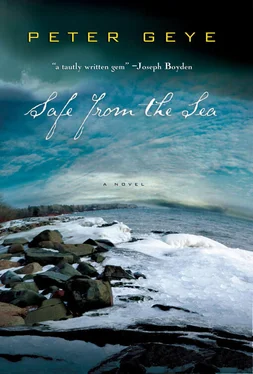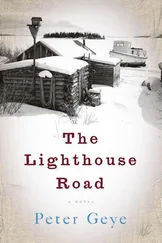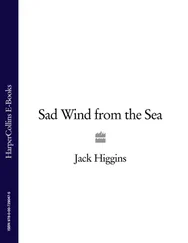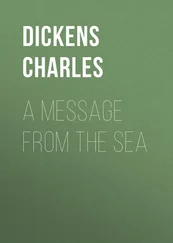“You all set? You comfortable?” he asked.
Olaf reached for Noah’s arm.
Noah touched his father’s hand. He held it there. “I’ll be right in there if you need anything. Just call.” Olaf was already fighting sleep.
THE NEXT MORNING blazed bright, sunny and white and windless. A profound silence had beset the house, beset the wilderness around it. Noah stood at the window inspecting the weight of snow hanging on the pine trees, the whiteness everywhere a testimony to the vagaries of that place. The whiteness was disturbed only by the bark on the south side of the trees, on the limbs of hardwoods too thin to hold snow. He tried to gauge the snow’s depth, but the drifts confused him. Snow sloped gently on the north side of the shed to the eaves but had been blown nearly clear on the south side of the roof.
He turned to look at his father, still asleep on the couch. His rest appeared easy now, the rising and falling of his chest steady if not slowing.
He stepped into his boots. Snow knee-deep had drifted onto the top step. He kicked it away and surveyed the yard. He thought he’d never felt air so cold or seen any so clear. He contemplated the fate of the wolves in the deep snow, contemplated the fate of Vikar, wondering why the dog hadn’t come home for the storm. He lingered there, bracing himself against the cold, a new abundance of faith in the days ahead.
Back inside, Olaf lay awake. Except for his right eye, which was bruised, the old man appeared better, as if the long sleep had done something to whittle away at his dying. Noah asked him how he felt.
In a voice practically inaudible he asked, “You seen the dog?” “I haven’t. I was just wondering about him.”
Olaf coughed. He cleared his throat and sat up to spit in the water glass on the coffee table. “Put a bucket of food out for him. He usually comes around after a snow. Builds a den under the steps.” Noah opened all the curtains. “I’ll put the food out in a minute. Will he be all right, with the snow and cold and everything?” “He usually is. Maybe he finally ran off with the wolves.”
“The call of the wild.”
“Your favorite story when you were a boy.”
“Get out in the woods and stay,” Noah said.
Olaf propped himself up on an elbow. “I need a hat. Something to keep me warm.” “I’ll find one.”
Noah fetched the orange hat from its peg on the porch. He gave it to his father, who struggled for a moment before handing it back to Noah and lifting his head slightly. Noah put his hands inside the cap, stretched it out, and pulled it down over the old man’s ears. Olaf leaned back on his pillow.
Noah went to the kitchen counter. He ground more pills and mixed them with another glass of water. He helped his father drink the potion.
“What day is it?” Olaf said.
“It’s Thursday.”
“In the morning?”
Noah looked at his watch. “It’s ten o’clock, a little after.” Olaf closed his eyes. “How much did it snow?”
“More than a foot, I think. There’s a drift to the eaves on the shed. And it’s cold. Below zero.” “The high after the low,” Olaf said.
Knowledge like that I’ll never possess , Noah thought.
Now Olaf opened his eyes. He looked at Noah. “It hurts. Bad.” He coughed. “It has for a long time.” Noah sat on the coffee table facing his father. “What can I do?” “There’s nothing to do.”
“I wanted to call Solveig, but I’m not leaving.”
“I’m glad she’s not here. I’ve got to be a sight.”
He was. “You look good. Better than last night.”
Olaf looked at the piano. “I dreamt of music.”
“You’re dreaming again? That’s good. You slept pretty peacefully last night.” “I feel better when I sleep.”
“You want to sleep now?”
“Wish I could.” He took a deep, unsteady breath. “I feel hollow.” “Is there anything else you want?” Noah asked.
“Pull the quilt over my feet,” Olaf said. “And just sit here with me.” Noah tucked the quilt around the old man.
Olaf began humming, more tunefully this time than the night before. Midway through the song he looked at Noah. He almost smiled through his baggy lips. Noah smiled back. He put his hand on his father’s.
After a moment Olaf said, “Your child, name him well.”
“Or her,” Noah said.
“Or her,” he echoed. “And love them.”
“Of course.”
“Tell you what. Take all the love I never gave you and heap it on your child. Maybe you’ll remember me a little more kindly that way.” He picked up the tune right where he’d left off.
“You don’t need to worry about me remembering you kindly, Dad.” He hummed the rest of the song. “My watch is on the nightstand. I want you to have it. Get it fixed.” “I will. I’ll treasure it.”
“I wish we could call Solveig. I should have had a phone line put in here years ago.” Noah got up to look at his cell phone. There was still no service. “I can go into town and call her. Do you want that?” “There’s no time for that. Just tell her that I love her, too. And the kids.” “I will.”
“Is it November yet?” Olaf said.
“It is,” Noah said, again checking his own watch. “November seventh.” “It’s always November,” Olaf said. Now he looked out the window. “Sit down for another minute, would you?” Noah did. Olaf reached up to touch his face. He held his son’s look. He pulled the boy to him exactly as he had thirty-five years ago. He kissed his forehead. Noah stayed there, close enough that he could feel his father’s breath. He wanted to tell him that he understood now. That he understood how his love had become cruel. He wanted to tell him he loved him. He couldn’t say anything.
Soon his father said, “Go put the food out for Vikar. I’m going to get some rest. I’m glad you’re here. I’m glad you came back.” Noah sat up. He’d closed his eyes in his father’s embrace but opened them now. When he did the old man was already sleeping again. He slept through the morning and the afternoon. He slept through the evening. He was still asleep when Noah himself dozed off on the chair sometime late at night.
The next morning Noah dressed warmly and shoveled a path down to the lake. Two hours’ labor that proved he’d underestimated the snowfall by half if not more. Again the sun shone and again the whiteness nearly blinded. He looked upon the lake bisected with skim ice, an arc of placid black water disrupted beyond the ice by thin ripples that flared under the cold, stiffening breeze. He felt a moment’s reprieve before he stepped onto the dock. But the ice cracked under the sway of the posts and he realized it was paper-thin, that the rowboat could easily break through it. As for the boat, it was buried like everything else under the snow. He shoveled it out, shoveled the dock, too.
The room had been very cold when he’d awoken. He had not stoked the fire during the night. In that lightness and chill he’d seen his father, seen the quilt not rising. He’d watched, hoping to convince himself that what he knew was wrong, that the light was insufficient or that the old man’s breathing had become that short. When he finally stepped to Olaf and touched his cheek, his knowledge became irrefutable. His father’s face was the same temperature as the air. Noah simply pulled the quilt up over the old man and knelt beside the sofa. Anyone passing by would have thought he was praying.
Back up in the yard he cleared a path to the shed. The sun did little to warm him, and his fingers and toes grew numb despite his exertion. He first took the wheelbarrow from the shed. Looking down the hill to the lake, at the snow everywhere, he pushed it aside and retrieved instead the old Radio Flyer ski sled from the rafters. He tied a rope to the back end of it. Now he stood before the anchor, the consequences of its purpose beyond any intelligence he possessed. Solveig was not there. Nor Natalie. He put his arms around the old barrel. With great effort he carried it to the sled sitting in the snow. He set it upon the seat, took one of the pieces of tubing in one hand and the rope in the other, and guided it down the hill. At the lake-shore he set it on the dock. He towed the sled back up the hill and retrieved the platform his father had fashioned to sit on the gunwales. By now the sting of the cold on his face drew his skin tightly to his cheekbones. The lobes of his ears had gone numb. He brought the platform to the dock and set it across the boat with some difficulty. The ice around the boat cracked as it had when he’d first stepped on the dock, its sound full in the otherwise silent day.
Читать дальше












